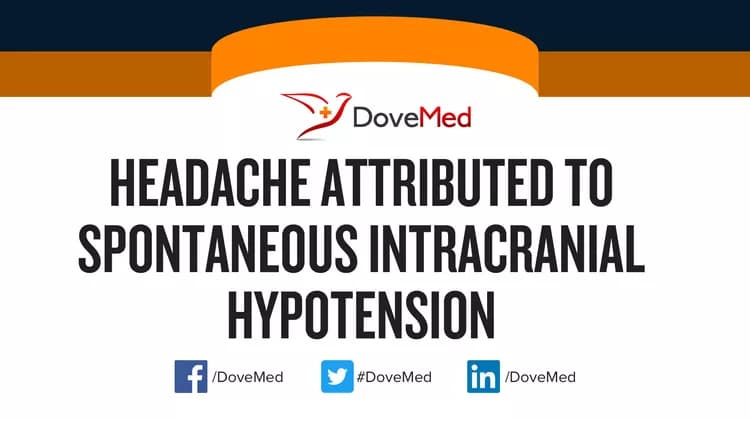
Headache Attributed to Spontaneous Intracranial Hypotension
What are the other Names for this Condition? (Also known as/Synonyms)
- Headache Attributed to Primary Intracranial Hypotension
- Headache due to Spontaneous Intracranial Hypotension
- Low CSF-Volume Headache
What is Headache Attributed to Spontaneous Intracranial Hypotension? (Definition/Background Information)
- Headache Attributed to Spontaneous Intracranial Hypotension is a headache disorder that occurs secondary to spontaneous intracranial hypotension from reduced cerebrospinal fluid (CSF) pressure in the brain and spinal cord, in the absence of dural puncture procedures. The headaches are known to subside and disappear on CSF returning to normal pressure levels
- A spontaneous decrease in intracranial CSF pressure may occur in certain vascular abnormalities and connective tissue diseases. According to studies, not all individuals with spontaneous intracranial hypotension have an active internal CSF leak; in some, a low volume of cerebrospinal fluid can be causative. Also, some individuals experience orthostatic headaches following sexual activity; this may be due to leakage of CSF
- The cerebrospinal fluid (CSF) is the colorless fluid surrounding the brain and spinal cord (central nervous system). Any decrease in CSF pressure, usually from internal CSF leakage, can result in neurological signs and symptoms, including commonly “new onset” orthostatic headaches. The headache may be accompanied by other neurological signs and symptoms such as neck pain and stiffness, ringing in the ears, nausea and vomiting, balance issues, hearing impairment, and dizziness
- Individuals with orthostatic or postural headaches may experience a significant increase in intensity of the headaches on sitting or standing up from a lying or seated position respectively. In many, the condition may improve on lying down horizontally. In some spontaneous intracranial hypotension cases, the headaches may appear after a time delay following postural changes, which may take hours to recede even while being in a horizontal position
The criteria for diagnosis of Headache Attributed to Spontaneous Intracranial Hypotension as outlined by the International Headache Society (IHS) is given below:
- Either or both of the following:
- Low cerebrospinal fluid (CSF) pressure (less than 60 mm CSF)
- Evidence of CSF leakage on imaging
- Any headache fulfilling criterion below
- Headache has developed in temporal relation to the low CSF pressure or CSF leakage, or led to its discovery
- Not better accounted for by another ICHD-3 diagnosis
(Source: International Headache Society Classification ICHD-3, London, United Kingdom)
Related Articles
Test Your Knowledge
Asked by users
Related Centers
Related Specialties
Related Physicians
Related Procedures
Related Resources
Join DoveHubs
and connect with fellow professionals

0 Comments
Please log in to post a comment.